The Philippine banking sector is projected to maintain a net interest income of approximately US$13.9 billion by 2024, although a cautious outlook suggests a potential decline in annual growth rates thereafter. The ongoing digitization efforts are expected to continue driving financial inclusion and accessibility, positioning banks as key players in supporting economic development.
Overall, the banking industry in the Philippines is adapting to changing consumer behaviors and economic conditions while facing challenges that require strategic management and innovation.
In the face of rapid business digital transformation, banks are recognizing the need for integrated systems that can streamline their workflows, enhance data security, and ensure regulatory compliance. This is where Enterprise Resource Planning (ERP) systems come into play. ERPs provide a comprehensive solution to the intricate operational challenges faced by the banking industry.
In this article, we explore the top 7 ERP software in Philippine that can transform the banking industry in the country, offering features that cater to its unique needs.
Table of Contents
Key Takeaways
|
10 ERP Software for Banking Industry Recommendation
ERP software can affect how it works. Then, to achieve maximum efficiency, choosing the right ERP software can be important. Here are several Philipine ERP software for banking industry recommendations:
1. HashMicro
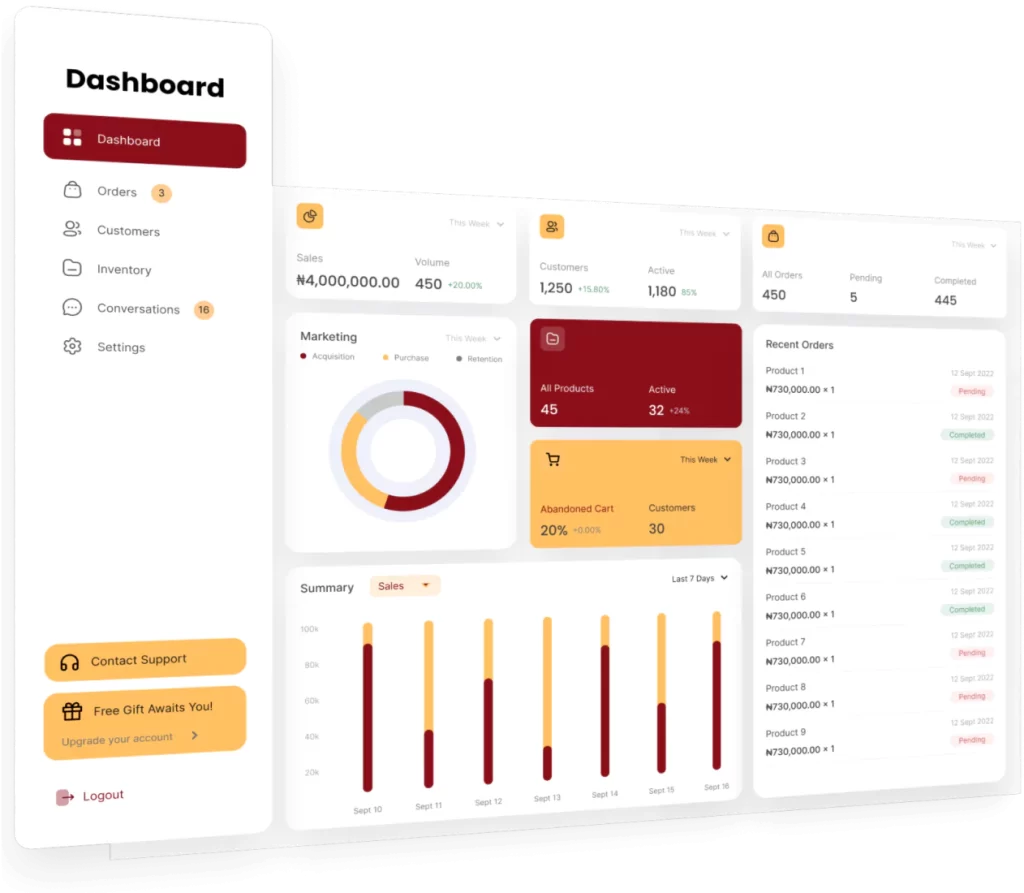
HashMicro is widely recognized as the best ERP provider in Phillipine, serving over 1,750 clients from world-class enterprises. The company offers a comprehensive suite of modules and features tailored to diverse industries, including banking, delivering robust solutions that address critical needs.
HashMicro’s banking software contains several benefits for the banking industry, including:
- AI-powered analytics: Lead to a deeper comprehension of market patterns and consumer inclinations. This enables the customization of services to match individual customer requirements, ultimately boosting satisfaction levels and encouraging customer loyalty.
- Increase data security: HashMicro is typically cloud-based and comes equipped with a range of security measures to safeguard sensitive data. These measures include robust firewalls and multi-step authentication protocols, significantly reducing the risk of data breaches.
- Customizable and configurable: The system’s customizable and configurable modules enable banks to tailor the ERP solution to their specific operational goals. This adaptability enhances efficiency, customer satisfaction, and regulatory compliance.
The system also includes various modules specifically designed to cater to the banking industry’s unique needs:
- CRM: The Customer Relationship Management (CRM) module enables banks to manage client interactions, track customer histories, and create personalized experiences. This helps banks build stronger relationships, increase client retention, and drive revenue growth.
- Procurement: This module streamlines the purchasing process, managing supplier relationships and ensuring the efficient procurement of goods and services. For banks, this means cost-effective operations, optimized supply chains, and timely access to necessary resources.
- Accounting: The Accounting module offers comprehensive financial management, tracking revenues, expenses, and assets. It ensures accurate financial reporting, compliance with regulatory standards, and efficient budgeting, which are critical for the banking industry’s financial stability.
- HRM: The Human Resource Management (HRM) module manages the bank’s workforce, including recruitment, payroll, performance evaluation, and employee benefits. This helps banks maintain a motivated and efficient team, ensuring smooth day-to-day operations.
- Visitor: This module tracks and manages visitor logs, providing secure and efficient access control to banking premises. It ensures that only authorized individuals can access sensitive areas, helping to maintain security and compliance.
- Help desk: This module provides an effective customer support system, handling inquiries and resolving issues promptly. In the banking sector, this is crucial for maintaining customer trust and satisfaction, as well as ensuring smooth operations.
HashMicro offers the ideal solution for the banking industry with its comprehensive software. For those interested in exploring how HashMicro’s banking software can transform their institution, we invite you to download the price scheme below. Discover how our solutions can enhance your bank’s efficiency and competitiveness, ensuring continued growth in an evolving market.
2. Oracle NetSuite
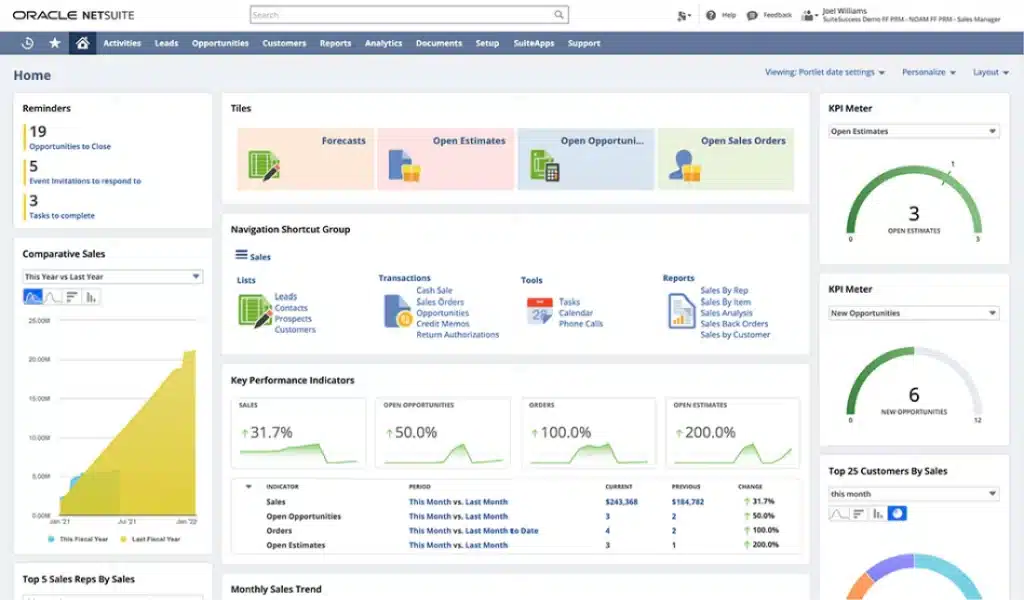
Oracle NetSuite offers solutions for financial institutions of all sizes. With a starting price below $100, it provides an affordable entry point for mid-range financial companies. For larger banks, Oracle NetSuite also offers a premium version, ensuring comprehensive service for low- to high-level financial corporations.
The software’s key features include support for multiple devices, ensuring accessibility across various platforms, and an intuitive interface, making it easy for users to navigate. Oracle NetSuite also includes an automated business intelligence setup, helping banks make informed decisions based on real-time insights.
However, Oracle NetSuite might not be the best fit for every business. Exploring Oracle NetSuite alternatives can help you find other ERP solutions that may better align with your company’s specific needs, offering similar comprehensive features with different customization options or pricing structures.
3. LeaseWave Suite
LeaseWave Suite is designed to manage the full transactional cycle of loans, leases, and mortgages for financial companies. Its automated alarm system alerts users to their due and debited amounts, keeping them informed of their financial status. The software’s dashboard allows the administrative panel to monitor up-to-date transactions.
LeaseWave also offers both front-end and back-end functionalities, facilitating integration between potential parties involved in financial transactions. This makes the loan process easier for all parties.
4. EBANQ
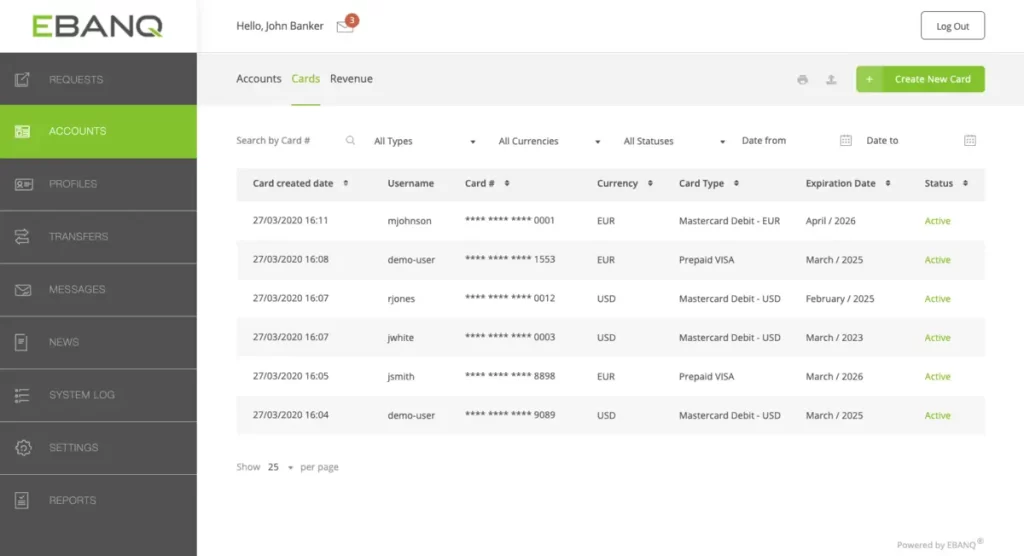
EBANQ is a smart e-application solution tailored to midrange financial industries, particularly focusing on mobile banking and e-payments. Its design facilitates seamless interaction between users and the administrative panel, making it a practical choice for banking operations.
The software stands out for its ease of use, making it a favorite among banking administration and end-users alike. The E-payment system simplifies transactions, while the intuitive interface ensures root-level users can navigate it with ease.
5. Cashbook
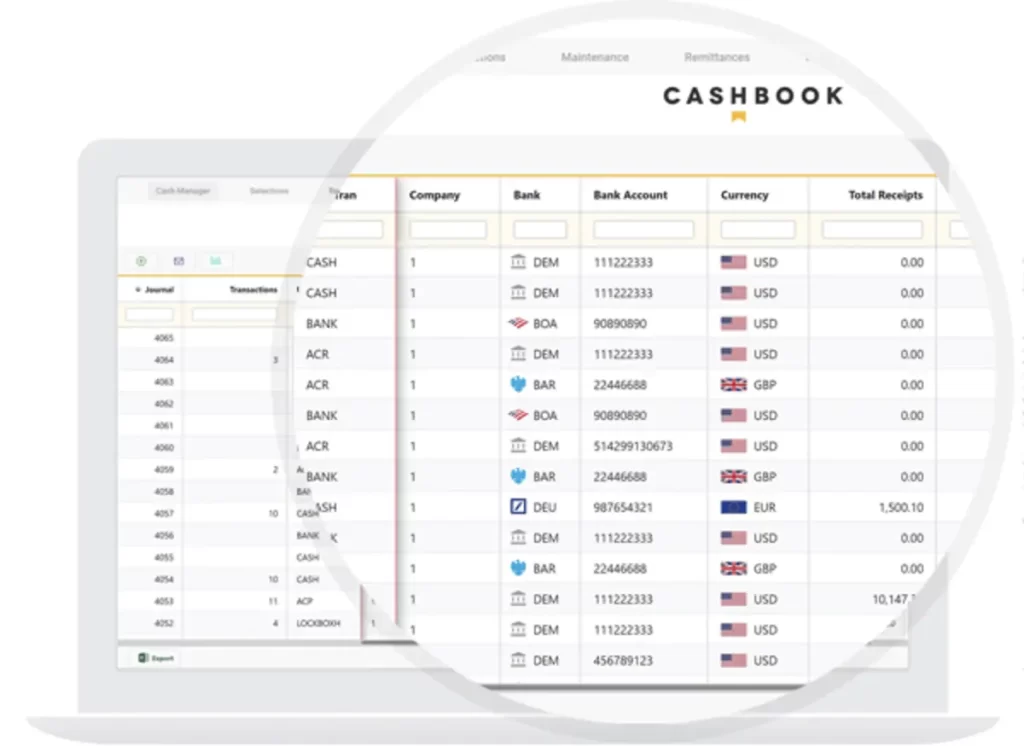
Cashbook is a comprehensive cash management automation software highly regarded for its versatile functionalities. This software efficiently records cash inflow, outflow, and provides instant balance statements, offering real-time insights into financial transactions.
One of its standout features is its support for multicurrency, multi-site, and multilingual capabilities, making it particularly popular in the banking sector where diverse currencies and languages are common.
6. Deskera
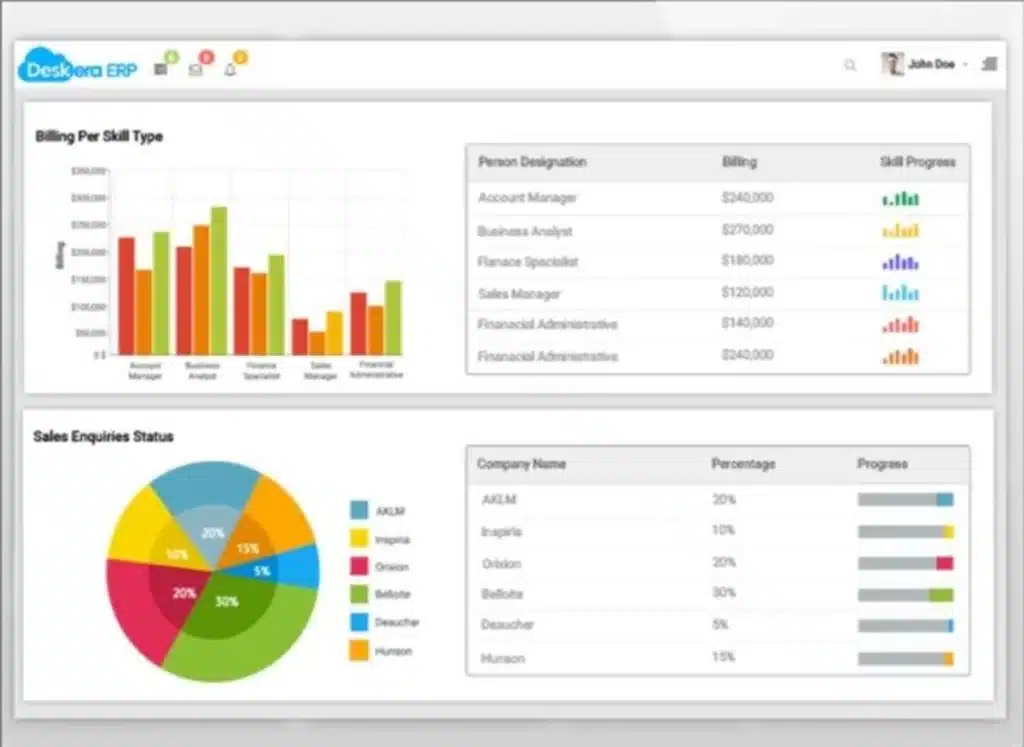
Deskera offers tailored ERP solutions designed specifically for the banking and financial services industry. With a deep understanding of the sector’s unique requirements, Deskera provides the best ERP usage in banking, empowering financial institutions to optimize their operations and stay competitive in a rapidly evolving landscape.
For insurance companies, Deskera’s ERP solutions offer unparalleled benefits, streamlining processes and enhancing efficiency across the board. By leveraging Deskera ERP, insurance companies can manage their financial transactions more effectively and bring their business practices to a standard of excellence.
7. CoBIS Microfinance
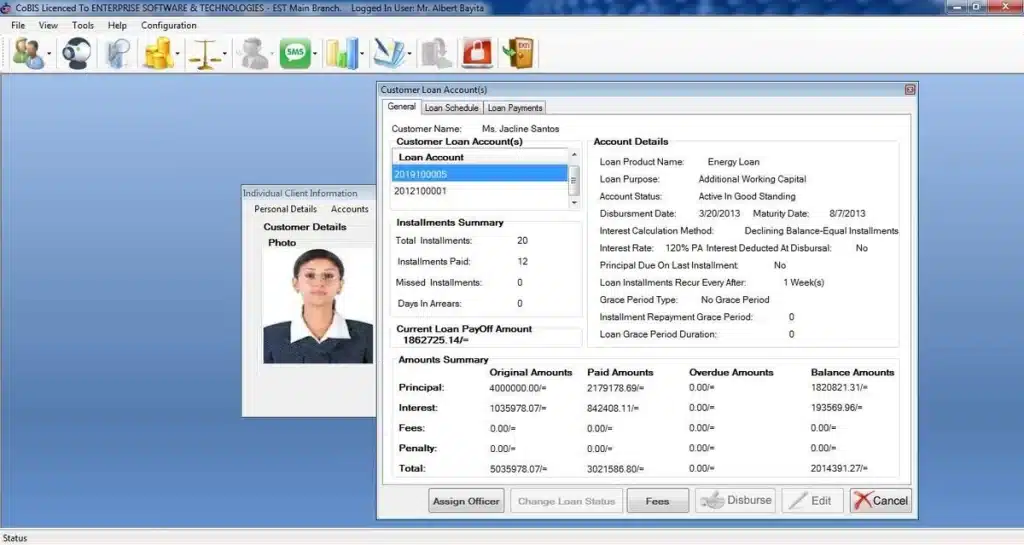
CoBIS Microfinance is a specialized software designed to manage micro-banking and SACCO (Savings and Credit Cooperative) operations efficiently. Its integrated system enables seamless completion of multiple business operations, making it a valuable asset for both users and administrative panels within microfinance institutions.
One of the notable strengths of CoBIS Microfinance is its ability to swiftly handle microservices for users, such as daily savings, term deposits, and shares listings. This capability allows microfinance institutions to cater to the diverse financial needs of their clients with ease.
8. Multiview Financial Software
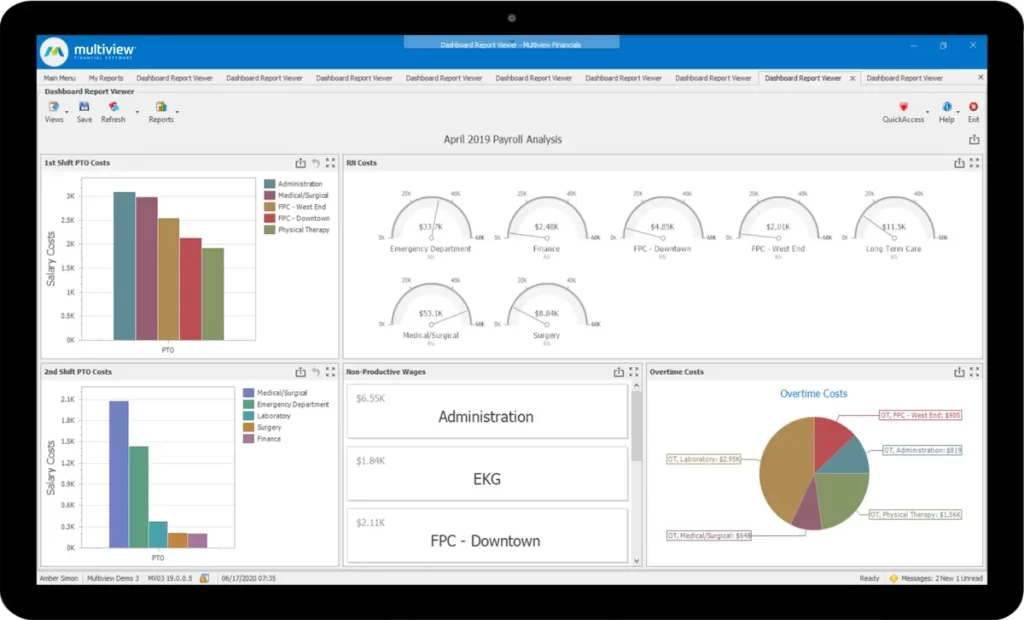
Multiview Financial Software offers businesses user-friendly financial applications designed to enhance financial planning and accounting processes. Created specifically for accountants by accounting professionals, this ERP software equips banks with dependable core accounting functions, including accounts payable, accounts receivable, and general ledger. Additionally, it offers valuable business insights, automation features, and inventory management tools. The Multiview Financial ERP platform enables organizations to maintain a unified source of truth, enhancing transparency and visibility across different divisions, regions, or product lines.
Also read: 10 Best Accounts Payable Automation Software in Philippines
9. Priority Software
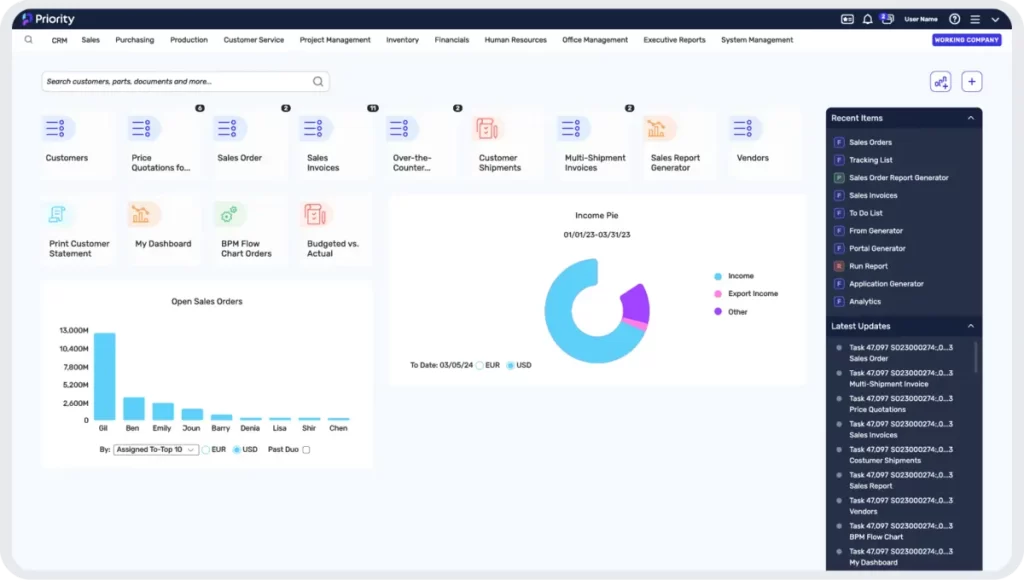
Priority Software offers versatile and scalable ERP solutions designed to meet the needs of organizations of all sizes. With built-in AI, an intuitive user interface, and a suite of social engagement tools, the system provides seamless reporting, mobile management, and advanced business intelligence. Key features include CRM, HR management, cash management, customer service, project management, as well as cost and budget control, delivering a comprehensive toolset for various business needs.
As a cloud-based ERP platform, Priority Software empowers banks and financial services firms to monitor business performance in real time, gain meaningful insights, forecast outcomes, and automate daily operations. By providing a centralized system for streamlined processes, Priority Software supports enhanced decision-making and operational efficiency across the organization.
10. Workday
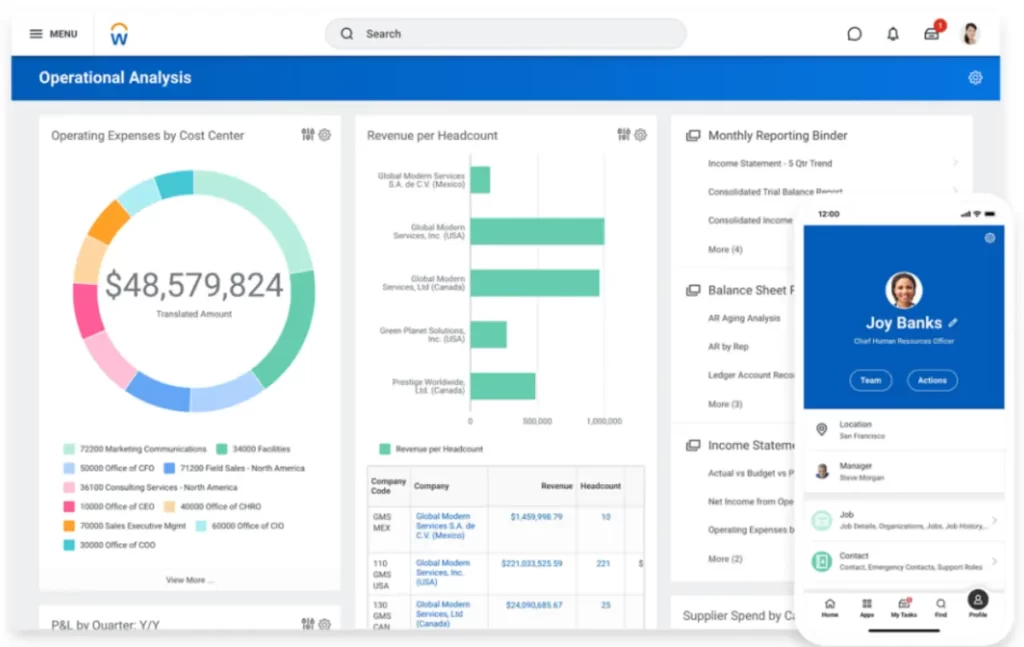
Workday delivers cloud-based ERP software designed for medium-sized businesses and large enterprises across a range of industries. Its service offerings include financial management, HR, payroll, talent management, analytics, planning, and workforce management, allowing organizations to consolidate fragmented systems and achieve greater visibility into their data.
In the banking sector, Workday provides robust capabilities, such as AI-powered financial reporting, expense management, margin planning, and built-in audit support. Additional features include talent management, supplier contract oversight, employee onboarding, and human resource management, equipping banks with comprehensive tools for operational efficiency and compliance.
Conclusion
In the banking industry, the right ERP software can make all the difference in optimizing operations, enhancing customer experiences, and ensuring regulatory compliance. From managing transactions to streamlining administrative tasks, the top ERP solutions highlighted in this article offer comprehensive features tailored to the unique needs of financial institutions.
Among these solutions, HashMicro stands out as a trusted partner for banks and financial organizations in the Philippine and beyond. With its extensive experience, customizable modules, and exceptional after-sales service, HashMicro provides a robust ERP solution that empowers banks to thrive in today’s digital era.
To experience the benefits of HashMicro firsthand, we invite you to try the free demo. Discover how HashMicro’s ERP software can transform your banking operations, and take the first step towards a more efficient and competitive future with HashMicro today!
FAQ about ERP Software for Banking
-
What is ERP software, and how does it benefit banks?
ERP (Enterprise Resource Planning) software is a comprehensive system that integrates and automates key business functions, such as financial management, HR, procurement, and customer service. For banks, ERP software streamlines these operations, enhancing efficiency, accuracy, and visibility across the organization. This leads to improved decision-making, reduced operational costs, and a seamless flow of information.
-
Why should banks consider adopting ERP software?
Banks deal with complex operations across various departments, including finance, compliance, human resources, and customer service. ERP software helps by consolidating these functions into a single platform, allowing for real-time data access, improved regulatory compliance, and streamlined processes. This centralization supports better customer service, risk management, and operational control.
-
How does ERP software improve financial management in banks?
ERP software enhances financial management by automating key processes such as accounts payable, accounts receivable, general ledger, and financial reporting. It provides real-time insights into cash flow, expenses, and financial performance, enabling banks to make data-driven decisions. Additionally, many ERP system offer AI-powered analytics for more accurate forecasting and budgeting.
-
What should banks consider when choosing an ERP software provider?
Banks should look for ERP solutions that offer robust security features, regulatory compliance support, and scalability. It’s essential to choose a provider with industry experience in banking, as they will better understand unique financial and compliance needs. Other important considerations include ease of integration with existing systems, user-friendliness, and strong customer support.
-
Can ERP software help with regulatory compliance in the banking sector?
Yes, ERP software is designed with features that help banks maintain compliance with industry regulations. By centralizing data and automating reporting, ERP systems reduce human error and provide audit trails, making it easier for banks to meet regulatory requirements. Some ERP solutions also include built-in compliance and reporting tools, ensuring that banks can adapt to regulatory changes efficiently..l
{
“@context”: “https://schema.org”,
“@type”: “FAQPage”,
“mainEntity”: [{
“@type”: “Question”,
“name”: ”
Pertanyaan Seputar ERP Software for Banking
-
What is ERP software, and how does it benefit banks?
ERP (Enterprise Resource Planning) software is a comprehensive system that integrates and automates key business functions, such as financial management, HR, procurement, and customer service. For banks, ERP software streamlines these operations, enhancing efficiency, accuracy, and visibility across the organization. This leads to improved decision-making, reduced operational costs, and a seamless flow of information.
-
Why should banks consider adopting ERP software?
Banks deal with complex operations across various departments, including finance, compliance, human resources, and customer service. ERP software helps by consolidating these functions into a single platform, allowing for real-time data access, improved regulatory compliance, and streamlined processes. This centralization supports better customer service, risk management, and operational control.
-
How does ERP software improve financial management in banks?
ERP software enhances financial management by automating key processes such as accounts payable, accounts receivable, general ledger, and financial reporting. It provides real-time insights into cash flow, expenses, and financial performance, enabling banks to make data-driven decisions. Additionally, many ERP systems offer AI-powered analytics for more accurate forecasting and budgeting.
-
What should banks consider when choosing an ERP software provider?
Banks should look for ERP solutions that offer robust security features, regulatory compliance support, and scalability. It’s essential to choose a provider with industry experience in banking, as they will better understand unique financial and compliance needs. Other important considerations include ease of integration with existing systems, user-friendliness, and strong customer support.
-
What should banks consider when choosing an ERP software provider?
Banks should look for ERP solutions that offer robust security features, regulatory compliance support, and scalability. It’s essential to choose a provider with industry experience in banking, as they will better understand unique financial and compliance needs. Other important considerations include ease of integration with existing systems, user-friendliness, and strong customer support.
-
Can ERP software help with regulatory compliance in the banking sector?
Yes, ERP software is designed with features that help banks maintain compliance with industry regulations. By centralizing data and automating reporting, ERP systems reduce human error and provide audit trails, making it easier for banks to meet regulatory requirements. Some ERP solutions also include built-in compliance and reporting tools, ensuring that banks can adapt to regulatory changes efficiently.
“,
“acceptedAnswer”: {
“@type”: “Answer”,
“text”: “ERP (Enterprise Resource Planning) software is a comprehensive system that integrates and automates key business functions, such as financial management, HR, procurement, and customer service. For banks, ERP software streamlines these operations, enhancing efficiency, accuracy, and visibility across the organization. This leads to improved decision-making, reduced operational costs, and a seamless flow of information.”
}
},{
“@type”: “Question”,
“name”: “Why should banks consider adopting ERP software?”,
“acceptedAnswer”: {
“@type”: “Answer”,
“text”: “Banks deal with complex operations across various departments, including finance, compliance, human resources, and customer service. ERP software helps by consolidating these functions into a single platform, allowing for real-time data access, improved regulatory compliance, and streamlined processes. This centralization supports better customer service, risk management, and operational control.”
}
},{
“@type”: “Question”,
“name”: “How does ERP software improve financial management in banks?”,
“acceptedAnswer”: {
“@type”: “Answer”,
“text”: “ERP software enhances financial management by automating key processes such as accounts payable, accounts receivable, general ledger, and financial reporting. It provides real-time insights into cash flow, expenses, and financial performance, enabling banks to make data-driven decisions. Additionally, many ERP systems offer AI-powered analytics for more accurate forecasting and budgeting.”
}
},{
“@type”: “Question”,
“name”: “What should banks consider when choosing an ERP software provider?”,
“acceptedAnswer”: {
“@type”: “Answer”,
“text”: “Banks should look for ERP solutions that offer robust security features, regulatory compliance support, and scalability. It’s essential to choose a provider with industry experience in banking, as they will better understand unique financial and compliance needs. Other important considerations include ease of integration with existing systems, user-friendliness, and strong customer support.”
}
},{
“@type”: “Question”,
“name”: “Can ERP software help with regulatory compliance in the banking sector?”,
“acceptedAnswer”: {
“@type”: “Answer”,
“text”: “Yes, ERP software is designed with features that help banks maintain compliance with industry regulations. By centralizing data and automating reporting, ERP systems reduce human error and provide audit trails, making it easier for banks to meet regulatory requirements. Some ERP solutions also include built-in compliance and reporting tools, ensuring that banks can adapt to regulatory changes efficiently.”
}
}]
}



































